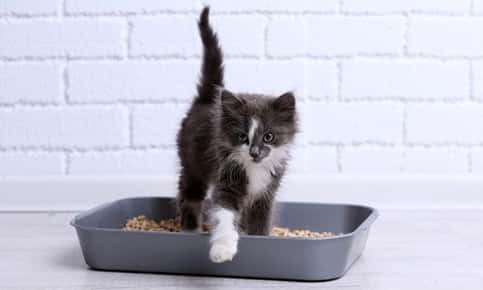
Do you favor the rapid swoop-and-bag approach to picking up your dog's stools or scooping cat litter? Although most pet owners would rather not prolong contact with their pet's feces, sneaking an occasional peak can provide valuable clues about your furry friend's health and habits.
Brown, Green or Yellow: What Stool Colors Mean
Normal stools are brown, although stool color may vary slightly depending on your pet's diet. Feces get their brown color from bile, a liquid produced by the liver that aids in the digestive process. If your dog's stools are yellow or white, he or she may have a liver condition. Pale stools may also mean that digested food passes through the gastrointestinal tract too quickly or might indicate that there is a problem with your pet's gallbladder or pancreas.
Have you noticed that your pet's stools are suddenly black or red? Red stools or red streaks in feces occur when bleeding occurs in the lower part of the digestive tract. Black stools may be a sign of bleeding higher in the digestive tract. Although the blood was originally red, it darkens as it makes it way through the small intestines. Does your pet enjoy snacking on grass? Although the habit is usually harmless, it can turn the stools green.
Stool Odor and Consistency Is Just as Important as Color
Feces never smell good, but some bowel movements smell worse than others. All stools have an odor, but the smell shouldn't be overwhelming if your pet is healthy. Ideally, stools should be firm but pliant and resemble the sausage link segments.
Both diarrhea and hard stools can be a sign of health problem. Soft, loose stools may be caused by:
- The Things Your Pet Eats. If your pet foraged through the garbage for table scraps or found something interesting to eat on his nightly walk, it's not unusual for diarrhea to occur.
- A Change in Diet. Switching to a different brand or type of food can upset your pet's gastrointestinal system and cause diarrhea.
- A Food Allergy. A food allergy or intolerance may affect food absorption in the gastrointestinal tract.
- An Infection or Illness. Loose stools may be a sign of a viral illness or a bacterial or parasitic infection.
- Inflammatory Bowel Disease (IBD). IBD doesn't just affect people, but can make your cat or dog's life uncomfortable too. Other IBD symptoms include vomiting, flatulence, loss of appetite and weight loss.
Stools may be harder and smaller than normal if your pet is constipated or dehydrated. The problem can occur if your pet eats a high-fiber diet, eats pet food that contains too many fillers or has kidney disease.
If hip dysplasia or arthritis is a problem, defecating may become such an uncomfortable experience that your pet avoids it as much as possible. Unfortunately, ignoring the urge to go may cause constipation. Cats may occasionally develop constipation because they avoid using a litter box that's too dirty in their opinion.
If it's been a few days since your pet has had a bowel movement, it's time to make an appointment with the veterinarian. In some cases, constipation can occur due to a life-threatening blockage in the gastrointestinal tract.
Greasy feces or mucus-covered stools may also indicate a health problem. Mucus may appear due to an inflammation in the large intestine or rectum, constipation, food allergies, dietary changes, stress, constipation, infections or illnesses, polyps, tumors, or an infestation of tapeworms, whipworms or other parasites.
The Contents of Your Pet's Stools Provide Important Clues
It's not unusual to see small pieces of your lawn in your pet's stools if your dog or cat enjoys eating grass. From time to time, you may notice other objects in the stools, such as:
- Hair. Hair may be particularly noticeable in cat feces, but can occur in any pet. Excess hair in the stools, coupled with bare spots on your pet's skin, may be signs of allergy or parasitic infestation.
- Worms. If your pet's stools seem to move, it's not your imagination. you may spot a few wriggling worms that look like grains of rice in the stool if your pet has tapeworms. Roundworms resemble long strands of spaghetti.
- Very Strange Things. Pets don't always limit their snacks to things we consider food. You may notice pieces of ribbons, string, aluminum foil, cotton balls, rocks or soap in your pet's stools.
Are you worried that changes in your pet's stools could be a sign of a health problem? Call us to schedule an appointment for your furry friend.
Sources:
PetMD: What Should My Dog’s Poop Look Like?
https://www.petmd.com/dog/care/how-should-my-dogs-poop-look
Rodale’s Organic Life: 6 Things Your Dog’s Poop Can Tell You About Its Health
https://www.rodalesorganiclife.com/home/healthy-dog-poop
Pet MD: What Should My Cat’s Poop Look Like?
https://www.petmd.com/cat/general-health/what-should-my-cats-poop-look

